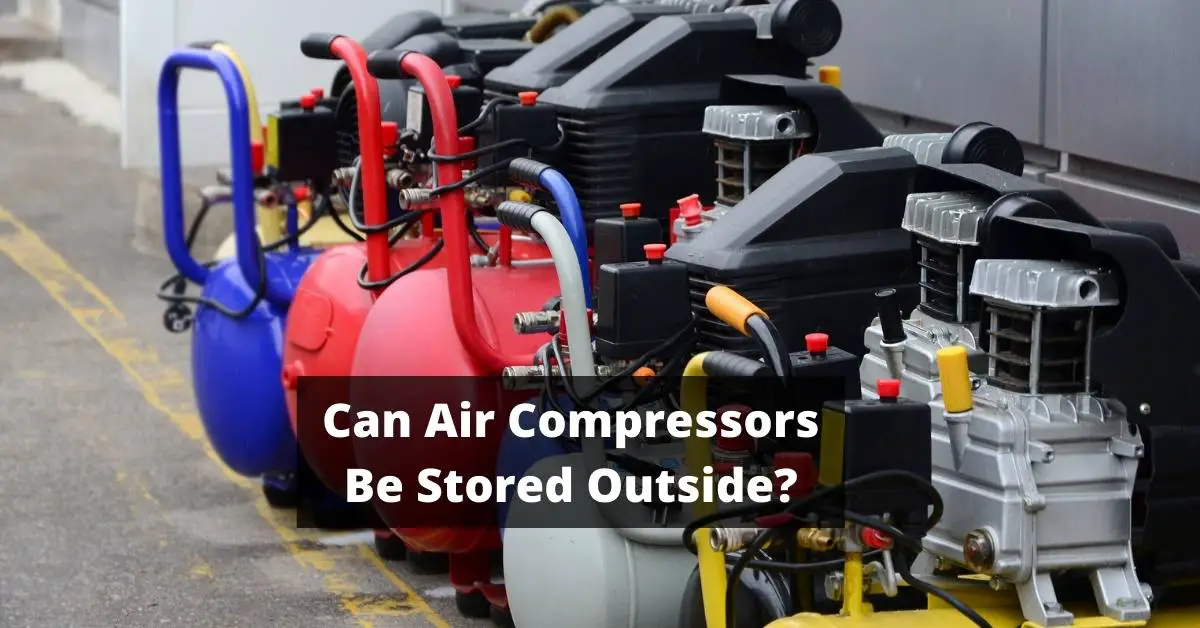Do Air Compressors Need Oil?
Just like any other mechanical device, an air compressor needs oil to have a smooth and proper function.
The oil lubricates the moving parts within the compressor, keeping them cool and reducing wear and tear.
If your air compressor does not have enough oil, it will overheat and eventually break down. In some cases, running an air compressor without oil can void the warranty.
To sum it up, yes – air compressors need oil to run correctly and last a long time. Be sure to check the level of oil in your compressor regularly and top it off as needed.
How to Know When an Air Compressor Needs Oil?

Date of Last Oil Change:
Knowing when you last changed your air compressor oil is the first step in knowing if it’s time for another change. You can find this information either in the owner’s manual or on a sticker inside the compartment where the oil is kept.
Oil Level:
Once you know when the last oil change was, check the level of oil in your air compressor.
If it’s been a while since the last change, there may not be enough oil, which can damage the compressor. Add oil as needed until it reaches the “full” line on the dipstick.
Oil Color:
The colour of your air compressor oil can also give you clues about when it needs to be changed. Fresh oil is usually a golden colour, while dirty oil is darker. If you see black or brownish-coloured oil, it’s time for a change.
Motor Starts Burning:
If the motor on your air compressor starts to sound and smell like it’s burning, that’s a sign that it has started heating due to a lack of oil.
The lack of lubricates in the moving parts of the compressor, or it’s low or dirty, those parts can start to wear down, causing the burning sound.
How to change the Air Compressor Oil?

It’s important to regularly change the oil in your air compressor to keep it running smoothly and efficiently.
Depending on how often you use your compressor, you should change the oil every 3-6 months. Here’s a step-by-step guide on how to do it:
- Start by draining the old oil from the compressor. You can do this by disconnecting the drain plug at the bottom of the unit and draining the oil into a container.
- Once all of the old oil has been drained, replace the drain plug and fill the unit with new oil. Use only lubricating oil that is specifically designed for air compressors – don’t use motor oil or any other type of oil.
- Once the compressor has been filled with new oil, close the fill cap, start it up, and let it run for a few minutes to circulate the oil throughout the system.
- Finally, turn off the compressor and check the oil level. Add more oil if necessary, then close the fill cap.
Changing the oil in your air compressor is a quick and easy way to keep it running properly. By following these simple steps, you can extend the life of your compressor and ensure that it continues to perform at its best.
Visual Explanations: https://www.youtube.com/watch?v=8weCB7fmMj0
What Can Happen if You Add Too Much Oil?
If you add too much oil to your air compressor, it can cause a number of problems.
The oil can leak out, making a mess and potentially damaging the engine.
It can also cause the engine to overheat, which can lead to serious damage.
If you’re unsure about how much oil to add, consult your owner’s manual or ask a professional for help.
Are there different types of Air Compressor Oils?

Standard Oil:
This is the most common type of air compressor oil. It is a petroleum-based oil that is light in viscosity and has good lubricating properties. It is typically used in air compressors that operate at lower temperatures.
Synthetic Oil:
This type of air compressor oil is high in quality than standard oil and is designed to withstand higher temperatures.
It is also more resistant to breakdown under high pressure than standard oil. Synthetic oils typically cost more than standard oils, but they may extend the life of your air compressor.
Visual Explanations: https://www.youtube.com/watch?v=IFS5NDQg8hg
Are there Oil-Free Air Compressors?
As you know by now, air compressors are a vital piece of equipment in many industries, from automotive manufacturing to food and beverage processing.
They provide the power needed to operate pneumatic tools and machinery and can be used for a variety of other applications.
While most air compressors use oil to lubricate their moving parts, some oil-free models are available on the market.
These air compressors typically use synthetic lubricants or special coatings on their internal components to reduce friction and prevent wear.
Oil-free air compressors have several advantages over their oil-lubricated counterparts. They require less maintenance and are less likely to experience problems such as leaks or contamination.
Oil-free air compressors also tend to be more energy-efficient, as they don’t have to work as hard to maintain proper lubrication.
If you’re in the market for an air compressor, talk to your local equipment dealer or rental company about oil-free models. You may find that an oil-free air compressor is the best choice for your needs.
Oil-Free vs. Oil-Injected Air Compressors: What is the Difference?

Oil-Free vs. Oil-Injected Air Compressors: What is the Difference?
Air compressors are an essential piece of equipment for many businesses and professionals. They come in a variety of types, each with its own advantages and disadvantages. One key distinction between different types of air compressors is whether they are oil-free or oil-injected.
Here’s a closer look at a few key differences between oil-free and oil-injected air compressors:
Cost:
Oil-free air compressors tend to be more expensive than oil-injected models. This is because they typically use higher-quality materials and components, which results in a higher price tag.
Maintenance:
Oil-free air compressors don’t require any lubricating oil, so they’re generally easier to maintain than oil-injected models. However, they may require more frequent filter changes to keep the air quality high.
Repair frequency:
Oil-injected air compressors may require more frequent repairs than oil-free models. This is because the lubricating oil can break down over time, leading to increased wear and tear on the compressor.
Air quality:
Because oil-free air compressors don’t use any lubricating oil, they tend to produce cleaner air. This is important for businesses that rely on air compressors for critical applications.
Visual Explanations: https://www.youtube.com/watch?v=DXdFAJMshVo
How to do the Maintenance of a Lubricated Air Compressor?

Regular Inspect of,
Hoses:
At the inspection of hoses, generally check for any leaks, cracks, or blockages. Also, ensure that the hoses are not kinked, as this can cause airflow issues.
Air Filter:
The air filter is important to check because it helps to ensure that only clean air is entering the compressor. A dirty air filter can cause a number of issues, including decreased efficiency and increased wear on the compressor.
Airend:
The airend is the part of the compressor that actually compresses the air. It is also considered the heart of the compressor. It is important to inspect the airend for any leaks or damage.
Periodic Oil Level and Condition Check:

It is important to check the oil level in the compressor on a regular basis. This can be done by checking the sight glass or dipstick. If the oil level is low, add more oil until it reaches the full mark. You should also check the condition of the oil. If it looks dirty or has any debris, it should be replaced.
Always use the Best Quality Oil:
Using the best quality oil is important for two reasons. First, it can help to extend the life of your compressor. Second, it can help to improve the efficiency of the compressor.
Fully Drain the Tank after Every Use:
It is important to drain the tank after every use fully. This will help prevent rust and corrosion from building up inside the tank. It is also important to drain the tank when it is going to be stored for an extended period of time.
Related Matters
Do all air compressors need oil?
No, not all air compressors need oil. However, most air compressors do require some lubrication in order to function properly.
Compressors that use oil tend to be more durable and require less maintenance than those that don’t use oil.
If you’re unsure whether or not your compressor needs an oil, consult the owner’s manual or contact the manufacturer.
How much oil does my air compressor need?
Well, that depends on the compressor. Some compressors come with a quart-sized tank, and others come with an eight- or ten-gallon tank.
In most cases, it’s recommended that you fill the tank at least half full. Adding oil to the compressor helps to keep it running smoothly and prevents wear and tear on the machine.
Be sure to use a quality oil specifically designed for air compressors; using the wrong type of oil can cause damage to the compressor.
If you’re not sure how much oil your compressor needs, consult the owner’s manual or contact the manufacturer for more information.
Can you put motor oil in an air compressor?
No, you cannot put motor oil in an air compressor. The oil will damage the compressor and could cause a major problem.
Always check your air compressor’s owner’s manual for the manufacturer’s recommended oil type and amount.



